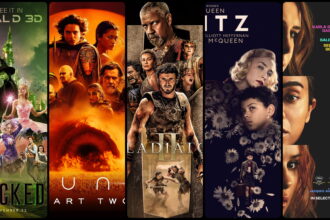Brad Pitt’s ‘F1’ Is a Global Juggernaut—But What Does Its Success Actually Mean?
$144 million.
That’s how loud Brad Pitt’s Formula 1 drama roared out of the global gate this weekend—$88.4M of it from international circuits, across 78 markets. For Apple Original Films, this isn’t just a win. It’s a moment. A tipping point.
You can feel the shift.
Up until now, Apple’s presence in the theatrical game felt like a cautious toe-dip—tentative prestige plays, awards contenders, prestige-over-popcorn. But F1, under Joseph Kosinski’s high-octane direction, isn’t here to win Oscars. It’s here to dominate weekends.
And it just did.
Across the Globe: Pitt Is Still Gold
This isn’t just “good for Apple.” It’s monstrous by any metric. In fact, F1 opened stronger than Once Upon a Time in Hollywood (+34%), Bad Boys: Ride or Die (+58%), and Bullet Train (+152%). In 74 of 78 overseas markets, it was the No. 1 U.S. film—proof that even with Hollywood’s engine sputtering, star power plus sport can still ignite.
The UK led the charge at $9.2M—even with a heatwave distracting viewers. China followed closely at $9M, including a staggering $3.8M from IMAX alone (43% of the national total). In Mexico, F1 zoomed past Top Gun: Maverick’s opening by 38%. France ($5.4M), Australia ($5M), and UAE ($2.7M) all posted career bests for Apple, Kosinski, and even Pitt.
That’s the story here—not just F1 performing well, but it doing so in places where Formula 1 is religion. Eastern Europe. The Middle East. Latin America. This wasn’t just a movie—it was event cinema for people who already know what a chicane is.
The Kosinski Factor
There’s also a pattern emerging here—and its name is Joseph Kosinski.
The director behind Top Gun: Maverick has a knack for translating velocity into narrative. His frames don’t just capture speed; they honor it. They respect the physics of risk. And in F1, that seems to be paying off once again.
IMAX numbers—$27.7M globally—tell their own story. This is a movie built for immersion, not streaming. And audiences are responding exactly the way Apple hoped they would.
So what now? Will Apple stick to theaters more aggressively? Can F1 sustain its velocity? The questions are circling, but one thing’s clear: this wasn’t a fluke. It was a strategy.
Meanwhile… Zombies Don’t Die Quietly
In the shadow of F1’s monster weekend, another legacy film quietly made history: 28 Years Later crossed the $100M mark globally, becoming the biggest earner in Danny Boyle’s undead saga.
$103M and counting—fueled by a second weekend international haul of $13.7M. The drop from opening weekend was a modest 49%, and its international cume now stands at $52.7M. It’s already outperforming Sinners (+26%) and Smile 2 (+18%) and holds pace with A Quiet Place Part II and Evil Dead Rise.
Let that sink in. In an era saturated with horror IPs and soulless sequels, 28 Years Later didn’t just show up—it stood up.
It proved that slow-burn dread still sells. That Boyle’s original vision has legs—even when they’re rotting.
Where It Gets Complicated
Here’s the rub: F1 is a global smash, but it’s also a uniquely international movie. The box office dominance isn’t just because of Pitt’s smirk or the rev of the engines—it’s the backdrop. The circuits. The fact that F1 isn’t just a sport—it’s a status symbol, a cultural passport, a European obsession turned global product.
If this film had been about NASCAR, it wouldn’t have landed this way in Korea or France or the UAE. Apple knew that. Kosinski knew that. It’s cinematic geopolitics, and F1 just played it perfectly.
Meanwhile, 28 Years Later proves there’s still hunger for horror that feels human. That franchise doesn’t run on jump scares—it runs on dread, grief, rage. The original was about a virus. The sequel was about survival. This one? Word is it leans hard into what comes after—the psychological rot, not just the infected.
That’s what makes its $100M run significant. It didn’t need to go bigger. It just needed to go deeper.
So, What’s the Real Takeaway?
F1 is Apple’s big bang. 28 Years Later is Boyle’s haunting echo.
One proves streaming giants can make box office blockbusters if they commit fully. The other reminds us that horror—when done with meaning—still terrifies and resonates.
Two very different films. Two very different strategies. But both thriving.
Which leaves me wondering: maybe the future of film isn’t about finding the next formula… but about trusting the ones that still work. Whether it’s the thrill of a high-speed race—or the horror of a world that’s already ended.
Top 10 Worldwide Box Office – Weekend Ending June 29, 2025
| Rank | Title | Weekend Gross | International | Domestic | Global Total |
|---|---|---|---|---|---|
| 1 | F1 | $144M | $88.4M | $55.6M | $144M |
| 2 | How to Train Your Dragon | $32.7M | $32.7M | N/A | $454.4M |
| 3 | 28 Years Later | $13.7M | $13.7M | N/A | $103M |
| 4 | Elio | $11.4M | $11.4M | N/A | $72.3M |
| 5 | Lilo & Stitch | ~$10M* | N/A | N/A | $946M |
| 6 | Inside Out 2 (est.) | ~$7.5M* | N/A | N/A | ~$1B+* |
| 7 | The Watchers (est.) | ~$6.2M* | N/A | N/A | ~$84M* |
| 8 | A Quiet Place: Day One (est.) | ~$5.5M* | N/A | N/A | ~$59M* |
| 9 | Bad Boys: Ride or Die (est.) | ~$4.7M* | N/A | N/A | ~$386M* |
| 10 | The Bikeriders (est.) | ~$3.9M* | N/A | N/A | ~$35M* |
Did F1 win you over with speed—or are you still haunted by the slow-burning brilliance of 28 Years Later?













